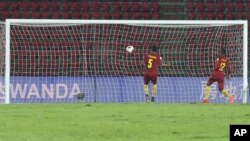An investigative journalist in Ghana who helped expose a high-ranking official at world soccer body FIFA as corrupt was shot dead by gunmen on a motorbike as he drove home alone at night, police said Thursday.
His employers said he was assassinated.
Ahmed Hussein-Suale was killed late Wednesday, shot twice in the chest and once in the neck at close range while driving in the suburb of Accra where he lived. He died immediately, according to police.
Tiger Eye PI, the investigative journalism house Hussein-Suale worked for, said it had the hallmarks of a professional hit.
“We call on the security agencies to unmask the elements behind this assassination and bring them to book,” Tiger Eye PI said.
Police haven’t announced any arrests.
Hussein-Suale worked under the leadership of Anas Aremeyaw Anas, a renowned Ghanaian investigative journalist once singled out and praised by former U.S. President Barack Obama as courageous and who has used undercover television documentaries to expose graft and organized crime in Ghana and across Africa.
Anas, who himself has gone undercover to investigate issues like human trafficking and corruption among Ghanaian judges, appears in public wearing elaborate, multicolored veils over his face to protect his identity. The veils allow him to work without being recognized but also help to avoid reprisals.
Anas confirmed Hussein-Suale’s death on Facebook: “Sad news, but we shall not be silenced. Rest in peace.”
The team’s most recent work focused on exposing corruption in African soccer, which they portray as a murky world of backroom meetings where coaches, referees and even the most senior officials can be bribed to fix games or hand out favors.
The team got one of its biggest scoops when it caught Kwesi Nyantakyi, a member of world soccer’s FIFA Council and the second most powerful man in African soccer at the time, taking a bribe of $65,000 from their undercover reporters, who were posing as unethical businessmen. Nyantakyi smiles as he stuffs the wads of cash into a black plastic bag and agrees to use his position as president of the Ghanaian Football Association to help the businessmen — for a cut of their profits.
Nyantakyi resigned from all of his roles and was banned from soccer for life last year for bribery, corruption and conflict of interest as a result of the documentary.
The film also alleged widespread corruption among other officials, referees and coaches, and the entire Ghana Football Association was shut down by Ghana’s President Nana Akufo-Addo as a result. The Confederation of African Football, the continent’s top soccer body, banned or suspended nearly two dozen referees and officials because of Anas’ team’s work.
Tiger Eye PI said Hussein-Suale’s last project for it was the soccer documentary. It didn’t say what other projects he was involved in for them. The BBC said Hussein-Suale worked with it on various projects, including an investigation into human body parts sold for ritual magic in Malawi.
Some of the methods used by Anas’ team have been questioned and stoked criticism, particularly the tactic of reporters posing as others to trap possibly corrupt figures. The methods have been denounced as illegal by some, including Nyantakyi, who said he will appeal his life ban from soccer.
Hussein-Suale’s killing also brought attention to comments made on television by a Ghanaian politician and businessman after the Nyantakyi scandal broke. Kennedy Agyapong, a member of parliament, appeared on his own television station to single out and denounce Hussein-Suale as “dangerous” and call for members of the public to assault the journalist up if they came across him.
Ranting and shouting into the camera, Agyapong said: “That boy (Ahmed-Hussein) that’s very dangerous, he lives here in Madina. If you meet him somewhere, break his ears. If he ever comes to this premises, I’m telling you, beat him. Whatever happens, I’ll pay because he’s bad, that Ahmed.”
The station also broadcast photographs of Hussein-Suale, apparently revealing his identity. Agyapong, in comments made on Ghanaian radio on Thursday, denied any involvement in the killing.
But in his Facebook message paying tribute to Hussein-Suale, and saying his team will not be silenced, Anas also posted a link to that Agyapong video.
“We ... remain unshaken in our resolve to pursue nation-wreckers and make corruption a high-risk activity in the country,” Tiger Eye PI said. “Ahmed was an excellent, experienced investigative journalist.”




